#from an essay on desire
Text
It seemed more honest to remain silent.
Ingeborg Bachmann, quoted by R. Kolewe in 'Afterletters: From an essay on desire'
3K notes
·
View notes
Text
I have to talk about Chester Arthur. His story makes me go crazy. A mediocre president from the 1880s who's completely forgotten today has one of the best redemption stories I've ever heard and I need to make people understand just how cool his story is.
So, like, he starts out as this idealist, okay? He's the son of an abolitionist minister and becomes famous as a New York lawyer who defends the North's version of Rosa Parks whose story desegregates New York City's trolley system.
Then he starts getting pulled into politics and becomes one of the grimiest pieces of the political machine. He wants money, power, prestige, and he gets it. He becomes the right-hand man of Roscoe Conkling, the most feared political boss in the nation, a guy who will throw his weight around and do the most ruthless things imaginable to keep his friends in power and destroy his enemies.
Because Arthur's this guy's top lackey, he gets to be Controller of the Port of New York--the best-paying political appointment in the country, because that port brings in, like, 70% of the federal government's funds in tariffs. He gets a huge salary plus a percentage of all the fines they levy on lawbreakers, and because he's not afraid to make up infractions to fine people over, he is absolutely raking in the dough. Making the rough equivalent of $1.3 million a year--absolutely insane amounts of money for a government position. He's spending ridiculous sums on clothes, buying huge amounts of alcohol and cigars to share with people as part of his job recruiting supporters to the party, going out nearly every night to wine and dine people as part of his work in the political machine. He's living the high life. Even when President Hayes pulls him from his position on suspicions of fraud, he's still living a great life of wealth, power, and prestige.
Then in 1880, his beloved wife dies. While he's out of town working for a political campaign. And he can't get back in time to say goodbye before she dies. Because he's a guy who has big emotions, it absolutely tears him up inside, especially because Nell resented how much his political work kept him away from home. He has huge regrets, but he just moves in with Roscoe Conkling and keeps working for the political machine.
And then he gets a chance to be vice president. The Republican Party has nominated James Garfield, a dark horse candidate who wants to reform the spoils system that has given Conking his power and gave Arthur his position as Port Controller. Conkling is pissed, and he controls New York, and since the party's not going to win the election without New York, they think that appointing Conkling's top lackey as vice-president will pacify him.
They're wrong--Conkling orders Arthur to refuse--but Arthur thinks this sounds like a great opportunity. The only political position he's ever held is Port Controller--a job he wasn't elected to and that he was pulled from in disgrace. Vice President is way more than he could ever have hoped for. It's a position with a lot of political pull and zero actual responsibilities. He'll get to spend four years living in up in Washington high society. It's the perfect job! Of course he accepts, and Conkling comes around when he figures out that he can use this to his advantage.
When Garfield becomes president, Arthur does everything he can to undermine him. He uses every dirty political trick he can think of to block everything that Garfield wants to do. He refuses to let the Senate elect a president pro tempore so he can stay there and influence every bill that comes through. He all but openly boasts of buying votes in the election. He's so much Conkling's lackey that he may as well be the henchman of a cartoon supervillain. On Conkling's orders, he drags one of Garfield's Cabinet members out of bed in the middle of the night--while the guy is ill--to drag him to Conkling's house so he can be forced to resign. He's just absolutely a thorn in the president's side, a henchman doing everything he can to maintain the corrupt spoils system.
Then in July 1881, when Arthur's in New York helping Conkling's campaign, the president gets shot. By a guy who shouts, "Now Arthur will be president!" just after he fires the gun. Arthur has just spent the past four months fighting the president tooth and nail. Everyone thinks he's behind the assassination. There are lynch mobs looking to take out him and Conkling. The papers are tearing him apart.
Arthur is absolutely distraught. He rushes to Washington to speak with the president and assure him of his innocence, but the doctors won't let him in the room. He gets choked up when talking to the First Lady. Reporters find him weeping in his house in Washington. Once again, death has torn his world apart and he's not getting a chance to make amends.
Arthur goes to New York while the president is getting medical treatment, and he refuses to come to Washington and take charge because he doesn't dare to give the impression that he's looking to take over. No one wants Arthur to be president and he doesn't want to be president, and the possibility that this corrupt political lackey is about to ascend to the highest office in the land is absolutely terrifying to everyone.
Then in August, when it's becoming clear that the president is unlikely to recover, he gets a letter. From a 31-year-old invalid from New York named Julia Sand. A woman from a very politically-minded family who has been following Arthur's career for years. And she writes him this astounding letter that takes him to task for his corrupt, conniving ways, and the obsession with worldly power and prestige that has brought him wealth and fame at the cost of his own soul--and she tells him that he can do better. In the midst of a nationwide press that's tearing him apart, this one woman writes to tell him that she believes he has the capacity to be a good president and a good man if he changes his ways.
And then he does. After Garfield dies, people come to Arthur's house and find servants who tell them that Arthur is in his room weeping like a child (I told you he had big emotions), but he takes the oath of office and ascends to the presidency. And he becomes a completely different man. His first speech as president mentions that one of his top priorities is reforming the spoils system so that people will be appointed based on merit rather than getting appointed as political favors with each change in the administration. Even though this system made him president. When Conkling comes to Arthur's office telling him to appoint his people to important government positions, Arthur calls his demands outrageous, throws him out, and keeps Garfield's appointees in the positions. "He's not Chet Arthur anymore," one of his former political friends laments. "He's the president."
He loses all his former political friends. He's never trusted by the other side. Yet he sticks to his guns and continues to support spoils system reform. He prosecutes a postal service corruption case that everyone thought he would drop. He's the one who signs into law the first civil service reform bill, even though presidents have been trying to do this for more than ten years, and he's the person who's gained all his power through the spoils system. He immediately takes action to enforce this bill when he could have just dropped it. He becomes a champion of this issue even though it's the last thing anyone would have expected of him.
He oversees naval reform. He oversees a renovation of the White House. He still prefers the social duties of the presidency, but he's respectable in a way that no one expected. Possibly because Julia Sand keeps sending him letters of encouragement and advice over the next two years. But also because he's dying.
Not long after ascending to the presidency, he learns he's suffering from a terminal kidney disease. And he tells no one. He keeps going about his daily life, fulfilling his duties as president, and keeps his health problems hidden. Once again, death is upending his life, and this time it's his own death. He's lived a life he's ashamed of, and he doesn't have much time left to change. He enters the presidency as an example of the absolute worst of the political system, and leaves it as a respectable man.
He makes a token effort to seek re-election, but because of his health problems, he doesn't mind at all when someone else gets the nomination. He dies a couple of years after leaving office. The day before his death, he orders most of his papers burned, because he's ashamed of his old life--but among the things that are saved are the letters from Julia Sand, the woman who encouraged him to change his ways.
This is an astounding story full of so many twists and turns and dramatic moments. A man who falls from idealism into the worst kind of corruption and then claws his way back up to decency because of a series of devastating personal losses and unexpected opportunities to do more than he could have ever hoped to do. I just go crazy thinking about it and I need you all to understand just how amazing this story is.
#history is awesome#presidential talk#i thought about his story again this morning#and was once again struck by the desire to chase people down and make them understand just how amazing this story is#and instead of harassing random strangers i decided to inflict it on tumblr again#my original essay was rather too long and dry and tangled up in too many other details#and didn't quite capture the 'i want to chase you down and look you in the eye and make you freak out about this with me' vibe of this stor#this still doesn't quite capture it but at least it's shorter#and prevents me from rambling to unsuspecting family members#sorry for inflicting this on you again but what else am i supposed to do?
4K notes
·
View notes
Text
*deep breath in*
the fears 👏 have always 👏 been (in one way or another) 👏 parallel 👏 to 👏 desire 👏
let me explain.
so many of the statements given by actual avatars center around some sort of need that was met by their entity. Lots of them even had a positive relationship with the fear that drove them.
Jane Prentiss is an excellent example - the Corruption has always been about a form of toxic and possessive love, but she personally has a deep desire to be “fully consumed by what loves her,” and finds a perverse joy and relief at allowing herself to be a home
Jude Perry is another - she fucking loved watching people’s lives be utterly destroyed. The Desolation only offered her a power of destruction on a grander scale, and then gave her a more intense rush of joy as she did its work. When she tells Jon that he needs to feed the Eye before it feeds on him, it’s almost as an afterthought; she was happily feeding the Desolation long before it burned her into a new existence.
Simon Fairchild. Every time that old loose bag of bones wanders into the picture, he is having a fucking EXCELLENT time playing with the Vast. He loves showing people their own insignificance, and he loves luring them into situations where he can throw them into the void as he smiles and waves.
Peter Lukas (hell, the whole Lukas family (except Evan. RIP Evan.)) hated. people. all he wanted was for them all to go away, to leave him alone. The Lonely only fulfilled that desire.
Daisy, Trevor, and Julia, all devoted to hunting those things they deemed monstrous.
Melanie, holding tight to that bullet in her leg because on some level, she wanted it. It felt good, it felt right, it felt like it fit right alongside the anger and spite that drove her to success.
Annabelle Cane first encountered the Web when she was a child, running away from home in order to tug on her parents’ heartstrings in just the right way to have them wrapped around her little finger. Later on she volunteered to be the subject of an ESP study. Hell, she’s the one who dangled the “Is it really You that wants this?” question over Jon’s head in S4.
And that brings us to Jon, beloved Jarchivist, the Voice that Opened the Door. Ever since he was a child targeted by the Web, he was looking for answers. He joined the Magnus Institute’s Research Department looking for them, he stalked his coworkers in search for them, he broke into Gertrude’s flat and laptop out of desperation for them. And when he realized that all he had to do was Ask to get truthful answers to his questions? It was only natural for him to jump at that opportunity.
Elias told S3 Jon that he did want this, that he chose it, that at every crossroads he kept pushing onwards, and the inner turmoil that caused was one of the focal points for Jon’s character through the rest of the podcast.
There’s a certain line of thinking in many circles about the power of the Devil: he’s not able to create anything new. All he’s able to do is twist and warp that which was already present, making it something ugly and profane while still maintaining the facade of something desirable.
Jon didn’t choose the Eye. But he did wander into its realm of power, exhibiting exactly the qualities it was most capable of hijacking and warping to its own ends. Jon didn’t choose the Apocalypse. But Jonah picked at him little by little, pointing him towards each Fear individually. Jon didn’t want to release the Fears. But the Web tugged on his strings just so and laid a pretty trail for him to follow until he reached its desired conclusion.
Jon didn’t choose ultimate power, or omniscience, or even his own role as Head Archivist. But he said “yes” to the right (wrong?) orders and kept on pushing for the right (wrong?) answers. He wanted to succeed at the work he had been assigned. He wanted to protect his friends. He wanted to rescue them when they were lost. He wanted to prevent the apocalypse, to save the world. He wanted to know why he was still alive, when so many had died right in front of him.
The Great Wheel of Evil Color that is the Entities might not fit as neatly into categories in this universe - maybe there was no Robert Smirke trying to impose strict categories on emotional experiences, or maybe the ways they manifest in the world has turned on its head (goodness knows many of them have been showcased and blended in some very fun and new and horrifying ways so far) - but their fundamental foundations seem to be the same. Hell, in episode one we learned that there had been enough individual incidents to create a distinction between “dolls, watching” and “dolls, human skin.”
Smirke’s Fourteen isn’t going to be relevant as common parlance, RQ said that already, but I don’t think that means the Fears themselves (and their Dream Logic-based rules) are different - I think it means that the levels of understanding, language used, and personal connections among people “in the know” are going to be entirely unfamiliar
#tma#tmagp#the magnus protocol#tmagp meta#tmagp analysis#the entities#robert smirke#smirke's fourteen#mind write a meta post that doesn’t turn into a fucking essay challenge#I literally thought about citing my episode sources here but decided that would get too FUCKING long.#anyway I’m pulling mostly from Gerry’s statement (111) and#and the Big Elias Group Confrontation (92)#and Annabelle’s statement (147)#and then finale - 196 / 197 / 200#there are other little lines that I grabbed - tbh feel free to ask about anything I’ve said bc I feel like I’m ready to defend a thesis#I’ve been thinking about this on and off for a few weeks since the desire thing started going around#I have an obsession with Themes as they relate to Worldbuilding and now I have subjected you all to it as well#I am serious tho if anyone wants me to pull the specific parts I’m talking about (whether cuz you have Questions or you wanna ref them too)#lmk#my hyperfocus on silly media brain might as well come in useful somehow#aight peace ✌️
212 notes
·
View notes
Photo
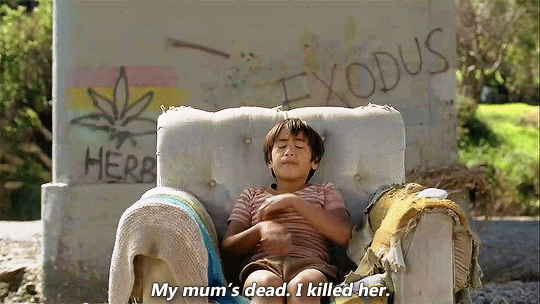


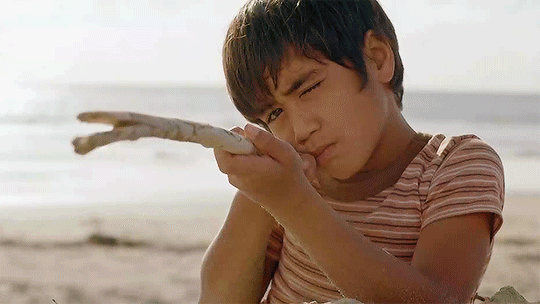



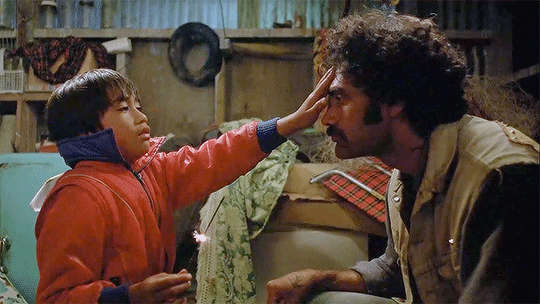

Rocky + magic
Boy (2010) dir. Taika Waititi
#boy (2010)#taika waititi#cricket gifs#do u get it.#this is like. a gifset about an essay i have simmering in the back of my head so here comes some long ass tags#rocky actually has magic first of all we love magical realism#second of all he has to learn to reconcile his powers (which he believes killed his mom) with his potential to do good#with those powers#so when he knocks alamein over that's a turning point bc he suddenly realizes he Could kill his only remaining parent too#so he imagines himself bringing back the rat from the dead while he's at joanie's grave#an obvious representation of his desire to be able to bring his mom back with the powers that killed her#then alamein starts to talk about how much he loves ET (and rocky wants to be loved) for his healing powers#so the next time we see rocky trying to use his magic after that is on leaf#but then he uses it on alamein#doing literally everything he can with the sparkler and the red jacket and the roller skates#to say i want to connect with you i want to be your son please forgive me#for killing her#sorry for what i did to mum#and it works. it works.
1K notes
·
View notes
Text
thinking about how stede has always been seen as like the Peak of non-toxic masculinity in the show and has always been the one to encourage the crew to open up and express themselves and yet. he still can’t accept himself as he is. he’s still striving towards this hyper masculine version of himself that he thinks he should be because he’s had it drilled into him from a young age that being soft caring and loving fine things is wrong. im literally going to throw up rn
#also the fact that so much of it comes from his love for his crew and and ed and his desire to protect them :((#listen if i was more articulate i could write a whole essay on this#ugly crying over stede bonnet rn#ofmd#our flag means death#ofmd spoilers#ofmd s2#ofmd s2 spoilers
87 notes
·
View notes
Text
Genuinely Zhou Ying from Tai Sui is one of the most insanity-inducing characters ever written, like
He's a prince. He's chronically ill. He eats almost nothing that isn't bland and medicinal. He hates his dad so much he wants to start a revolution to destroy him. He's born vaguely psychic and eventually becomes the closest thing his world has to omniscient. He starts his revolution by having two local politicians chopped into mincemeat, blended together, and poured out in the street. His favorite person in the world is his annoying little cousin that hides out at his house with him when he gets in trouble with his parents. He's probably a sociopath. He's murderous enough that all his servants and subordinates are scared of him. He has the same clothes made for himself every year. He founds and runs his universe's version of the CIA. He had his bones magically removed as a baby. He's a commentary on the way that psychotic and neurodivergent children are often villainized and mistreated by their caretakers. He has his bones un-removed over 20 years later. He's faking his chronic illness to cover up other, weirder chronic illness related to the bone removal and psychic thing. He loves his grandma. He purposely engineered his mother's miscarriage as a young child. He can turn himself into mist and break off chunks of his body while in mist form. He grew up with his consciousness halfway bound to a hell bubble full of demons. He has a personal assassin/assistant/general-purpose henchman that can turn into paper and ride around in his sleeve. He sometimes calls the henchman a cutesy nickname. He was partially raised by the living embodiment of emotional manipulation. He sometimes calls his annoying little cousin an even cutesier nickname. He tries to destroy the whole world in a fit of grief when he thinks his cousin's dead. He basically kills himself in order to plonk his soul into a magic mirror and see beyond the bounds of reality. He treats his own life and body as expendable assets because he was bred and raised to be a human sacrifice. He didn't speak for years as a child because the way he spoke scared his mother. His experience of the world is so alien and incomprehensible to others that a man with the power to play souls as music cannot understand his tune. He's a case study of the fact that sometimes you simply cannot save someone who doesn't want saving. He's thin and sickly from his illness but canonically beautiful. He has his father's eyes. He spoils his pet cat.
#like he's not even my favorite tai sui character#that honor goes to the main character himself mr. annoying cousin#but genuinely I have never encountered another character in fiction like zhou ying#I've written essay length posts about zy and all the ways he's similar to different characters written by the same author#but still I would say there is no character like zhou ying#he's chronically ill he's neurodivergent he's basically psychic he's kinda evil and has no empathy but is filled with love for his family#his desire to destroy the world is met by nothing but love and accepance from the protagonist. even as he stops him#he destroys himself successfully as the main character tries desperately and fails to stop him#literally no other character like him#tai sui#zhou ying#tai sui priest#priest#taisuiposting#tai sui spoilers#this post wasn't meant to be this long but I really got carried away talking about him#I love this novel#zhou ying my beloved
79 notes
·
View notes
Text
The Objecthead Phenomenon: Another Brief Essay

One of the most thought provoking concepts in 17776 is the idea of a mind with all the emotions and complexities of a human being forced to inhabit a completely inhuman body. Juice, Nine, and Ten do not, and never will, have human bodies. They will never experience what it is like to have a human body - additionally, this means machines, unlike humans, have to consider their own mortality and come to terms with their weird, disjoined, person-object existence.
The fact that space probes, who are completely physically different from an organic being, mange to be so human is something that makes 17776 so special. This also leads to me having what I can imagine are controversial tastes in fanart: I don’t particularly care for the “objecthead” designs and feel they undermine one of the most important things about Nine, Ten and Juice as characters.
Like, Jon Bois created these remarkable and bizarre characters, who are intentionally physically inhuman, something that has significance in the story - and people immediately decided to go ahead and draw them in order to…undo that. This is why the objecthead or humanized fanart saddens me a bit.
I do, however, understand the desire to further anthropomorphize the probes. After all, it’s frustrating for characters with such distinct personalities to be completely physically inexpressive. Nine, Ten, and Juice don’t have facial expressions (other than emoticons, of course). They don’t pose, they don’t wear clothes, they can’t touch or physically interact or any way. That makes it pretty much impossible to easily make visually interesting art, as you could only ever draw them. Uh. Floating in space. Visually unchanging. Forever and ever. Not exactly appealing.
In a way, the objecthead phenomenon in 17776 fanart provides some poetic insight: the idea that these beloved characters are objects is uncomfortable. We want to give them bodies that correspond with their personalities, we want them to be physically expressive. We want to give them these experiences that they will never be able to have. I can imagine that the probes feel these things too, this desire to have their consciousness match what their body looks and feels like.
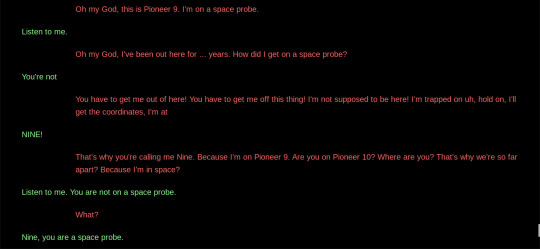
Practically the first thing Nine assumes when they wake up is that they are trapped aboard the probe and need to escape. They experience a moment of visceral panic and existentialism, which I found very distressing because they are trapped in a space probe. Their first instinct is to leave, to get out, and that will never happen. There is no hope of escape.
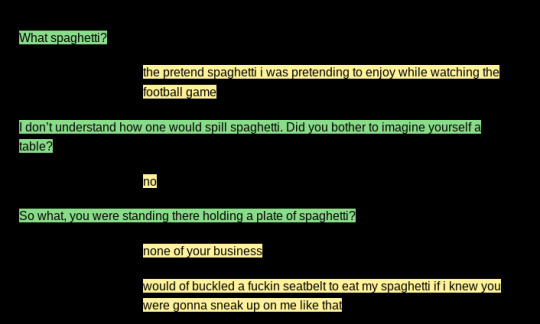
Juice also demonstrates this kind of thinking in a much more lighthearted way during the spaghetti conversation in the first chapter of 20020. The nonexistent bowl of spaghetti shows that the probes, or at least Juice, do imagine themselves with bodies, doing human things. This makes you wonder how often they think about the things they will never be able to experience. Do Nine and Ten wish that they could hug? Does Juice lament not being able to enjoy a Lunchable or catch a football?
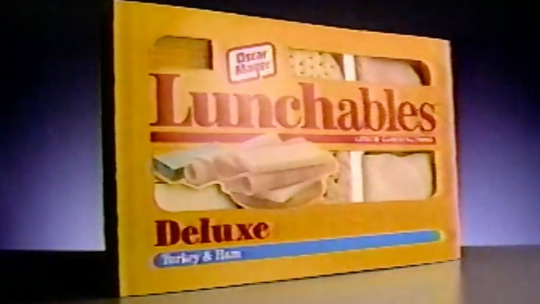
This was meant for my 17776 blog (@we-perpetually-hang-out) but is posted here instead due to tag issues.
#17776 football#17776#17776 juice#17776 nine#17776 ten#17776 spoilers#what football will look like in the future#Jon bois#Lunchables#essay#Analysis#i guess#My work#Tldr: I think that how we draw them is a representation of our desire for them to experience the joys of being human and I think that's sad#yeah#so ive been having this weird issue where posts I make for my main blog show up in tags but posts I make from my side blogs don't#if anyone knows how to fix that it would be greatly appreciated
29 notes
·
View notes
Text

That Awful OTP Meme, or: my Binah/Hod manifesto
I originally posted this on twitter but while this is mostly tongue-in-cheek I actually have a lot of thoughts on these two that are generally summarized by [god DAMN I love the interplay of two people who are varying degrees of Terrible]
or just, like, a Hannigram meme.
#fennelart#project moon#binah/hod#lobotomy corporation#lobotomy corporation spoilers#the thing is that binah has never had regrets. binah has never had the time or desire to let herself have regrets#hod on the other hand is Full of them. she is someone who is trying very hard to be a good person#but is going at it from an entirely selfish direction (circa lobcorp) and just ends up completely sucking anyway#which is honestly part of her appeal to me?#i like the idea of them picking each other apart which is a thing that is extremely one sided at first because. it’s Binah#but even binah is still human albeit an extremely fucked up one and I think if hod manages to poke her head out of her own issues she could#start to see where the lines are#also she (binah) is locked in a basement and bored as shit and will take anything remotely interesting at this point#hence where I put her on the devoted scale versus indifferent#could you call it romance?#it’s not healthy in the slightest but no ship with binah involved is lmao#anyway this whole essay in the tags is mostly to say I’m proud of myself for the black damage joke lmao#periodic black damage and a -50% debuff to your stats. its the give and take you know how it is#shoutouts to the person writing binah/hod in the ao3 tag like two years ago you thoroughly infected my brain
234 notes
·
View notes
Note
For the Halsin "don't deserve to see the sun again" theme, if the player fails to break the Shadow Curse before starting act 3, when they say goodbye to Halsin in the Shadow-Cursed Lands, he says, "I will miss you, my friend. Perhaps our paths will cross again some day, if the sun ever shines on this place once more." So... more of Halsin viewing the sun as a reward of sorts, or at least the absence of light as the ultimate punishment
It's about...the cyclical balance of the Sun being the most powerful of lifebringers, as well as the most dangerous of killers. It's about wishing for nothing more than to see the light after eons of darkness, but it blinds and burns you as it's primary reward; and your body sings for it - it has sung for it since the dawn of all times. No matter the hardship to bask in its presence, it is still, in the end, a symbol of hope. And isn't it - for those brief moments of happiness it brings the spirit - worth the hardship for a chance to have it look upon you again?
Purple prose aside, as the Sun is a life bringer, and there were entire druidian rituals and worship surrounding the Sun, I'm not surprised many of Halsin's tidings of bad fortune in his mind is an absence of being able to reap its benefits - whether that be figuratively or literally is up to interpretation (I think it's a bit of both).
It's also worth noting how one of his main wishes is that *everyone* can see the Sun, at all levels and walks of life, and that it is something that should never be limited to one's "worth" in society. It is a right, not a privilege.
Which does make Orin's mocking: "I do not deserve to see the sun again." twist the knife a little deeper in the gut.
#BG3 Musing#Jemi gets asks#anything post non-broken shadow curse from halsin destroys me and tbh as it should#the whole game does have an overarching theme of sunlight - of desiring to be in it#to bask in it#to live happily under its warmth#and to be denied it? by the very fundamentalism of one's being? or to feel you are not worthy of its light? it's tragic#i feel like a good essay could be written on the symbolism of the sun in relation to baldur's gate 3's narrative#or maybe i'm looking too deep into it idk#of course this does not extend to places like the underdark but i think they have their own forms of light
31 notes
·
View notes
Text
the scene in epel's second birthday vignette where floyd gave him the watch absolutely ruined me btw. like ik not everybody headcanons epel as trans but as someone who does it just put such a fine point on his struggle with being seen as masculine, like a fancy wristwatch wouldnt particularly help him look strong enough to overcome his bullies or whatever its literally just. something a man would own. and he gets so overjoyed. because he consistently has to *prove* that he wants to be masculine despite his appearance; even more sensitive characters like deuce take a while to catch on to the fact, and then here he gets the watch as a gift & gets called handsome without asking for it. even though its a happy scene it fucked me up so bad 😭
#txt#THATS ANOTHER THING i think contributes to his starting to fit in at pomefiore that ppl rarely bring up bc its most clear in this specific#card's vignettes & homescreen lines: epel really does care about his appearance!! and we see him start to have more fun with it & experiment#with style more; but it doesn't come across during the main story when he's just in his school uniform that vil arranged for him#and like. if you had Only read the harveston event & the main story i can kinda see where the 'epel is innately okay with feminine stuff &#vil is right for suppressing his desire to be masculine!!' argument comes from#but like. even if his affinity for masculinity is at any point little more than a rejection of femininity. his budding interest in masculine#*fashion* shows that his desired gender presentation is its own fully formed thing and not just the absence/hatred of something else#ergo he fits pomefiores principles of beauty & pride#does this make any sense. tumblr tags are the worst place to write an essay
26 notes
·
View notes
Note
hiiiiiii thinking abt how mei was super uncomfortable with the idea of mk visiting her house and all of the "normal kid stuff" she wasn't allowed to do and how she and mk share a lot of traits but only the ones that mei's parents wouldn't have approved of. mks literally like. the parts of her she doesnt want to bring home
HEYO! forgive me, i was asleep then had to get to class. also, i wanted to give myself time to actually talk about this because yeah
*pulls you down* listen, listen to me, until 1x03, MK had never even been inside Mei's house. he even states how he "always wanted to see inside Mei's Secret Dragon House," and Mei housesitting the place is the perfect opportunity for him to see what lies inside. AND! if you notice!!!
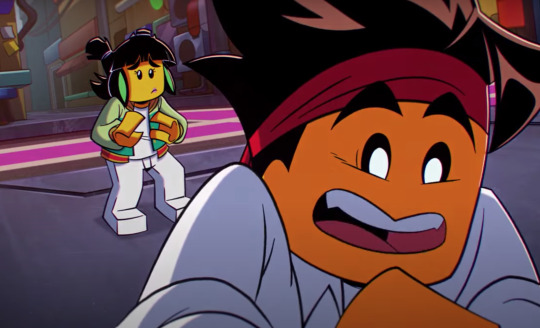
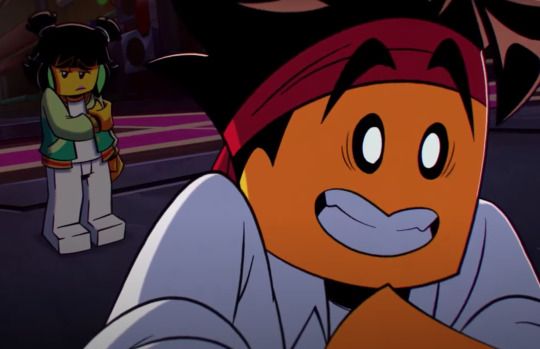
SHE IS SHOWN TO BE VERY UNCOMFY AT MK JUST SPECULATING WHAT "SECRETS" ARE HIDING IN THERE. INVITING MK WOULD BE THE EXACT OPPOSITE OF WHAT HER PARENTS ASKED HER TO DO!
but MK is so curious and he's her best friend and he might also just sneak in without her knowing.....so maybe she'll indulge him. housesitting is a lot better with friends than on your own.
anyway, if we go further into the episode, we see a Mei that is very different to our chaotic and confident gal. she's closed-in, cautious, nervous. unlike before, Mei is the one warning others not to touch things, to be careful, and to stay put. in previous episodes, we see her goofing off and being a little gremlin with MK while Pigsy blows a fuse over their antics.
not here though. this is her home. her clan's home. her clan's home full of ancestral heirlooms that she's been told all her lie to keep away from and not touch. respect your family and family tree is very important in Chinese culture (and many other Asian cultures but we're focusing just on one). even the language has different forms of formalities with addressing people (whether in the business environment, home, or school). but this is a very general observation, and i'm sure there are others who can talk about this a lot better.
however, Mei's family is very important to her character, so i will be discussing how it relates to her and her own decisions. on her own, Mei is very free-spirited and is more of a "punch first ask questions later" kind of person. when it comes to her family though, Mei is a lot more toned down and thinks first before acting. she is very aware of the priceless artifacts kept in her home (which is one factor on why she is nervous about inviting MK), and watching how she went about her home was like she was walking on eggshells. she doesn't want to upset and disappoint her parents.
additionally, Mei comes from a very well-off family. she is a part of the Western Sea Dragon clan. her ancestor is Ao Lie, the dragon-horse of the JTTW companions. why am i telling you things you already know? because it shows that Mei's family comes with a lot of history and recognition ("ancient noble dragons," as Mei had said). and with that, comes with the clan wanting to appear respectable in front of others. with such a high status, it is best to look the part, no?
however, Mei isn't really someone who fits into that noble lady box, right? she's outspoken, she's rowdy, she's impulsive. Mei even admit that as a kid she wished to do "normal girl stuff," stuff that wouldn't work out when your house is more of a museum than a home. i'm sure she did try to fit into that box for the good of her parents, but at some point, you come to the realization that that box will never fit you. Mei will never be perfectly noble or have the noble decorum that comes with her upbringing. she will never fit that ideal her parents raised her on (this is an assumption but also, it feels like a given?)
MK is the exact opposite of what Mei was taught to be proper. he is rowdy, likes to have fun, play video games, "roughs and tumble," and be impulsive. he is someone Mei definitely saw as the part of her she could never show her parents. how could they ever accept the side of her that does not care for strict decorum and keeping a house as a museum.
read this excerpt from her mom:
"We may not always see eye to eye, and your friends are...em, unique than we expected. But you are a part of this family, and it is part of you."
ignoring the incredibly sweet ending T^T the mother admits that Mei and her parents do have issues agreeing on what's best for Mei. there is love very clearly shown for between Mei and her parents, but there is still that distance between them. Mei is not the daughter they expected, and they don't always approve of her choices (her friends for example). so, we can figure that Mei is absolutely nervous about how her parents will feel about MK and whether that means they would stop loving her if she ever let down her walls in front of them completely.
#rewatched this episode just for you <3#where is this energy for my midterm essay T^T#i am once again only capitalizing names and proper nouns bc i am lazy and it's more fun#me at the beginning: this will be a short couple of comments. i will not ramble into a long meta commentary#me as i screenshot 2 scenes from the desired episode: this will still STAY a short response. i will not succumb to the meta gremlins#me at the end: .....fuck#lmk#lego monkie kid#lmk mei#lmk long xiaojiao#lmk analysis#lmk meta#asks
24 notes
·
View notes
Text
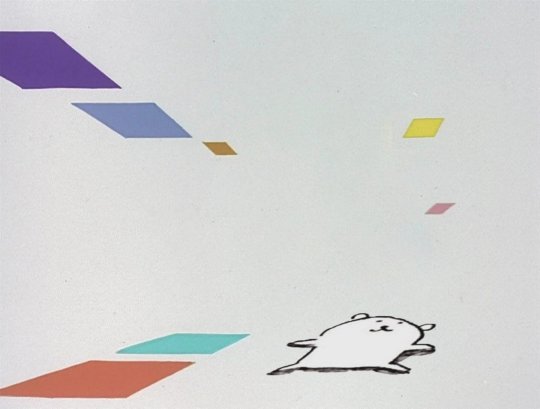
#i dont like travel much but can someone take me to italy to see michelangelos david i need to see him before i die#he's been the associative object (object. object) for my current brain spiral. the one i wrote that whole essay on the other day#the imitation of a human body the representation of a human body#i think i want to go somewhere i can see more sculptures representative of human beings in general#to cause myself more symbolic or metaphorical pain#the fenced off representation of a human body. you cannot touch it.#you cannot touch the statue. but also. you ARE the fenced off untouched statue.#desire and the desired and being an object and having and being a body and being and not being human#i want to be frozen in marble on the pedestal i want to be the pedestal i want to topple off the pedestal#the human body the human body the human body#⬅️ saying this all deliriously as if dying in your arms from blood loss#talkys#im not sure how to feel about the thoughts that have been swarming my brain lately but i feel like it could be made into art#if i were smarter#its like silkworms in their cocoon#in the way i would have never been the person to discover how to get silk from them i hate that i cant spin any of this into#something tangible and meaningful and poetic and real#i want to make art i want to be art i need someones hands to pull the fibers from my untouched brain#he's like a doll to me. i am a doll to me.#🌺
36 notes
·
View notes
Text
Yeah. Yeah.
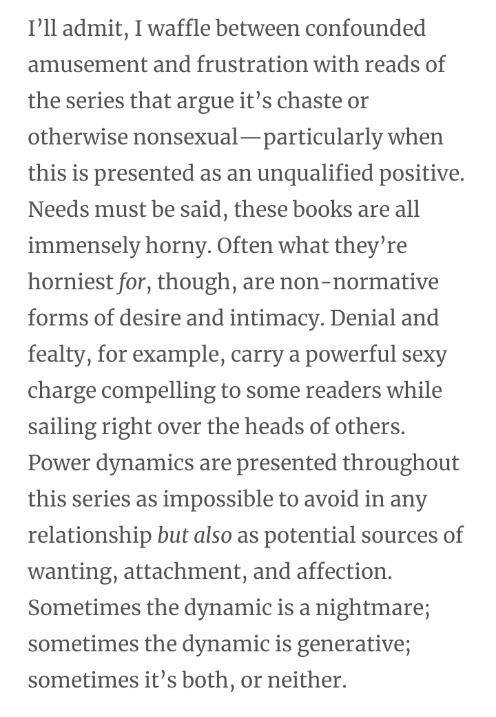
#not to say that i think she's presenting any of the power dynamics without interrogating them#and re: the dom/sub essay. that wasn't the point of gtn that's not it but it's like#the ways power is entwined with desire the question of whether the characters can separate those things#if you don't figure out a way to reconcile those things you might die if you do you might die#but fundamentally. these are the horniest books i have ever read in my life#everyone wants each other so so so badly. like badly enough that they might destroy the galaxy because of it#i don't think that's presented as a good thing necessarily but it's compelling#you truly cannot look away from some of these relationships
127 notes
·
View notes
Text
"Buck doesn't react to the ghosts because he has been able to see ghosts all his life and it's given him this fucked up relationship with death where he's both fascinated and desensitized to it" vs "Buck doesn't react to the ghosts because he spends most of the movie incredibly sleep deprived, constantly hallucinating and high off his ass on a transdimensional drug, so the ghosts are honestly only the 3rd weirdest thing thats happened to him that night"
#my desire for really interesting character exploration that's implied in the film#vs the comedic potential of him just going “this might as well happen LA is already so god damn weird”#cause like. he uses death as a metaphor A LOT in his songs esp Louisa. and he almost indifferent to the idea of dying himself#or killing for that matter. he just....doesnt really care all that much#and a lot of that I imagine would stem from the fact he'd be surrounded by it constantly and growing used to the concept#one day im gonna write that essay and/or fic about Buck and his fucked up relationship with death. one day#I have like four different posts about it in my drafts but it never comes out right#hes such a weird character I need to study him under a microscope#dani speaks#lord huron#vide noir#vide noir movie#lord huron vide noir#buck vernon
17 notes
·
View notes
Text
i rarely see any memes in this tag, y'all only know how to be analytical or anxious
#byler#I say this with all the love in my heart btw but every post is a 3k word essay#and I read them all but also at this point it's just different phrasing of the same evidence every time bc y'all have gone through canon#with a fine toothed comb and you've definitely gotten all the shit you're gonna get out of it#canon is a rag completely worn out and threadbare from all the wringing y'all are doing#canon is a sad limp orange rind after all the juice squeezing you've done#canon has a desire path worn through it with all the pacing back and forth you guys have done on it#anyway you get my point#a lot. like a LOT of analyzing#and the posts that AREN'T analysis are all just the ''but what if it doesn't happen 🥺'' posts#bc y'all have a ''we're getting queerbaited'' breakdown about every six hours#anyway. to reiterate. all the love in my heart. this is a joke
128 notes
·
View notes
Text
what ghost haunts you?

the ghost of devotion .
your body was crafted to be loved and to be adored. you write with the touch of a poet, the fingertips of a lover. if you are not loved, you are not whole. you are made to be sculpted by the hands of another into something perfect. without their love, you feel as though you may crumble without the support of purpose their touch provides. when ernest hemingway wrote “it was too good to last.” when ocean vuong wrote, “i miss you more than i remember you.” when david foster wallace wrote, “everything i’ve ever let go of has claw marks on it.”

the ghost of the damned .
you rot with the need for something more than what you have. the ghost is built up of the feeling of stagnation. you find it staring at the ceiling with sleep - blurred vision ; this is the third night you have met its eyes in the early hours of the morning. you tear yourself apart looking for comfort, for validation, for acceptance. but it never feels quite enough. you ruin everything you touch, despite every attempt to be more than what you have always been. you would sculpt yourself as something perfect for those around you, but you are no artist. when albert camus wrote, “be silent, heart; there is no hope!” when lucille clifton wrote, “maybe i should’ve wanted less. maybe i should’ve ignored the bowl in me, begging to be filled.” when taylor swift said, “i’m still on that tightrope, i’m still trying everything to get you looking at me.”
tagged by @primordyalsoul ty sumin!!!!
#TAGMEME.#iiiiiIIINTERESTING.....#dark's is fine as is but dai#his relationship with independence/dependence can get a little complicated#his desire is to be independent and he's stubborn about it- hence his rejecting dark's concerns or help sometimes#(that's where the 'what took you so long to call me?' comes from in tandem with constantly reminding daisuke#that they're one and the same; that dark -is- on daisuke's side and very much so. wholly loves and accepts him)#dark's longing is also a reflection of daisuke's longing; to be accepted and loved even within himself for his own flaws and faults#the reality for daisuke too is that so many people around him help and try very hard to care for him from his parents to his friends#the same way everybody remarks he's always trying to do his best for others- which is partly a symptom of dai wanting to be reliable#rather than solely relying on others all of the time... it goes in a big circle#smth smth coexistence and daisuke's simultaneous fear of being ostracized/persecuted for being dark#smth smth dante's inferno and the circle of thieves stealing each other's bodies but the way dark and daisuke learn to share#smth smth you were born to be a phantom thief but it's love that transforms you#dark's longing and loneliness is simultaneously daisuke's longing and loneliness always and forever BUT dark's stagnancy#his supposed state of perfection his immutability that makes him unearthly unhuman - he quietly loathes#dark relies on daisuke to change him too; to be kinder. warmer. the boy's his heart#the same way he's daisuke's supporting dream and aspiration!!!#aw man tag essay. embarrassing. point is dai's very devoted was born for it was destined for it#his family's love gets to the point it's overbearing sometimes but it's so so so genuine and so is his own once he gets to a state of it#but one cannot dismiss ...... the stubborn 'i can do it myself i don't need you' attitude(tm) dai has at dark sometimes#(even though dark is sooooo pathetic n desperate to be relied on)
5 notes
·
View notes